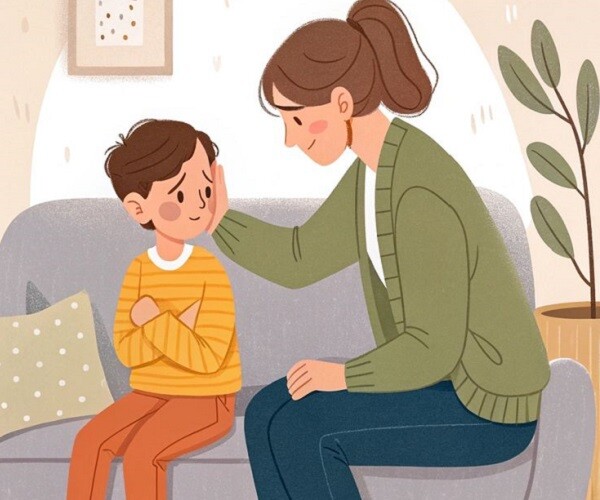In many families, expressing emotions is often not prioritized. Parents may be busy with work, spending little time with their children, or simply unsure how to show their love. Children growing up in this environment often miss out on learning how to say, “I love you, mom and dad.”
As these children grow up, they may become successful adults but lack emotions. While they may have many friends and a successful career, deep down, they can feel empty. This emotional deficit can lead to psychological issues such as anxiety and difficulty maintaining relationships.

Illustration photo.
Therefore, parents need to create a safe environment for their children to share their thoughts and emotions. At the same time, parents should clearly express their love for their children. Simple phrases like “I love you” or “I’m proud of you” can create a strong connection and make children feel loved.
Well-behaved and academically successful children who never say “I love you” to their parents are likely experiencing an emotional deficit and may face challenges in the future. Therefore, parents should help their children develop a whole heart, full of love, and foster better connections with those around them.

Psychologist Quang Thi Mong Chi.

According to the traditional definition, an obedient child is one who listens, is polite, studies hard, etc. But why do these children become distant from their parents and never express their love?
When a child grows up to be well-behaved and academically successful but does not express their emotions to their parents, especially not saying loving words, it often stems from the way we raise and build emotional relationships within the family.
In many families, especially in Asian cultures, “obedience” is often understood as obeying without causing trouble, excelling in academics, and being polite to elders. However, this sometimes means that children have to suppress their emotions, are not encouraged to express their emotional needs or reveal their personal thoughts. Children learn to be “proper,” but not to “emotionally connect.”
Additionally, if parents are too focused on achievements, expectations, and discipline while lacking intimate communication, expressing and modeling love—such as hugging their children, saying “I love you,” or listening and sharing emotions—children will form an avoidant attachment style.
As a result, children feel unsafe expressing their emotions or believe that expressions of love are “unnecessary” or even a sign of weakness. Ultimately, if parents don’t naturally say “I love you,” how can children learn to express it? Children learn by observing, so the lack of emotional modeling in the family will cause children to withdraw and become “emotionally cold” despite appearing “perfect” on the outside.

Why is saying “I love you” important for a child’s psychological development and family relationships?
When a child can say, “I love you, mom and dad,” and more broadly, knows how to actively express their emotions, it reflects not only their love but also their healthy emotional, personality, and secure attachment development within the family.
First, in terms of psychological development, when children can recognize and express positive emotions such as love, gratitude, or attachment, it indicates a certain level of emotional intelligence maturity—a fundamental factor in developing positive social relationships and regulating emotions in the future.
Second, saying “I love you” is a form of emotional communication that maintains and strengthens the connection between parents and children. In a warm family relationship, words of love act as the “lifeblood that nourishes the heart,” increasing feelings of love, safety, and belonging.
As a result, children will develop a fundamental belief in their self-worth and that of others, which is essential for developing a strong personality. Conversely, when children do not express their emotions, especially positive ones like love, it can lead to an emotionally deficient family relationship—where members live together but do not truly connect or feel warmth and closeness.
Over time, children may grow up feeling empty, finding it hard to open up, and not knowing how to express their feelings. Consequently, they may struggle to build intimate relationships later in life. Simply put, saying “I love you” is not just about three short words but about a heart that can feel, connect, and be nurtured correctly within the family. And when that heart knows love, it will never be empty.
Many children say, “I love my parents, but… I can’t say it out loud.” According to the expert, does unspoken love become something rigid?
Yes, if love is not expressed outwardly through words, actions, or emotional connection, over time, it can easily become distant, cold, and rigid—not only in the perception of the loved one but also within the inner heart of the person carrying that feeling.
When a child says, “I love my parents, but I can’t say it out loud,” it indicates a gap between their inner emotions and their ability to express them outwardly.
This rupture usually doesn’t occur naturally but stems from an environment that discourages emotional expression or even makes children fear being judged as “weak” or “sentimental” if they express their love.
Psychologically, unspoken love does not have the opportunity to be confirmed, creating no interactive response, and thus, no real connection between souls. In a family, if there is only silent sacrifice without words of love, hugs, eye contact, or listening, that love can become a silent responsibility rather than a rich emotional relationship.
Unspoken love can exist, but if it is not nurtured and cultivated, it resembles an underground stream—lonely and prone to depletion. Children—and adults—need to learn to “give love” in various ways, from words like “I love you” to caring actions and presence. When love is given, it doesn’t disappear but becomes the glue that binds family members together.
Therefore, knowing how to love but not expressing it—whether due to habit, personality, or culture—needs to be addressed and healed so that family love is not only present but also felt.

How can parents identify signs that their child is struggling to express emotions? And how should parents express their love so that children can learn from them?
Children who struggle to express their emotions may not be easily noticeable as they often behave “properly” according to standards—obedient, academically successful, and obedient. However, if parents observe closely, they may notice subtle signs indicating that their child is facing barriers in expressing their emotions.
Children often hesitate to hug their parents, avoid physical closeness, and feel awkward when told loving or appreciative words. They tend to shy away from conversations related to emotions and do not know how to express themselves when sad, angry, or moved. Some children choose to “love through actions” such as studying hard, giving gifts, or working diligently but may not know or dare to express their love directly.
Over time, these barriers cause children to withdraw and struggle to build close relationships, even within the family. To help children learn to express their emotions, parents need to start with themselves—by modeling. Frequently saying loving words like “I love you” or “I’m proud of you” not only creates warmth but also teaches children that emotions can and should be expressed.
In addition to words, small actions like a hug, a loving glance, holding hands while walking, or storytelling at bedtime are all languages of love that children deeply perceive. At the same time, parents need to practice listening to their children without judgment. When children share their emotions—even negative ones—the most important thing is to be present and acknowledge: “I understand that you’re feeling sad,” “I know today hasn’t been a good day for you.”
This creates a safe space for children to believe that expressing emotions is acceptable. Additionally, parents need to respect each child’s emotional personality. Not all children prefer to express their emotions verbally, especially introverted children. Instead of forcing them, gently encourage them with patience and warmth. When children show positive behaviors, encourage them respectfully instead of labeling.
Saying, “I’m proud of you for being considerate and sharing” will help children feel recognized rather than criticized by statements like “You’re such a crybaby.” Unspoken love can indeed become rigid. But if parents know how to “speak love” and “live love,” children will gradually learn to open up—first with their family.



































